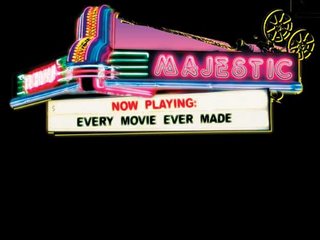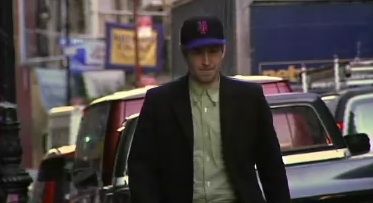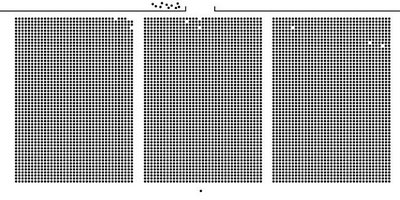Advertise on Earth
Update: A more puerile example.


 As their website states: "The BMW Art Car Collection is a series of BMW production models transformed from automobile to art by some of the world's foremost artists." Simple. 'Rolling Sculptures,' someone else labeled them. I am a particular fan of The Alexander Calder model. More on art cars in a more expanded sense, here.
As their website states: "The BMW Art Car Collection is a series of BMW production models transformed from automobile to art by some of the world's foremost artists." Simple. 'Rolling Sculptures,' someone else labeled them. I am a particular fan of The Alexander Calder model. More on art cars in a more expanded sense, here.


 A link, here, to the notorious auto-interview Vincent Gallo conducted with himself in 1997. Penned for The Beastie Boys' magazine, Grand Royal, (which folded in 2001) it was subsequently pulled for containing too many libellous comments about everyone he has ever worked with, or known, or simply heard about. An excerpt, as an example;
A link, here, to the notorious auto-interview Vincent Gallo conducted with himself in 1997. Penned for The Beastie Boys' magazine, Grand Royal, (which folded in 2001) it was subsequently pulled for containing too many libellous comments about everyone he has ever worked with, or known, or simply heard about. An excerpt, as an example; Karl Lagerfeld lends his sleight weight to Canderel. Begs the aesthetic question of whether it is in good taste to take your portable 'edulcorant' with you to the club.
Karl Lagerfeld lends his sleight weight to Canderel. Begs the aesthetic question of whether it is in good taste to take your portable 'edulcorant' with you to the club.



 House Attack, by Erwin Wurm. Installed on the external facade of Museum Moderner Kunst, Vienna for his current retrospective. A work which thrills with its witty objecthood, and touch of 'Where's Toto?'...However what it also does is illustrate once again how perfect some of the projects undertaken by Site Architects from the 70s truely were, in combining this sculptural slapstick with actual functionality. Their work for Best Products is phenomenal. See below for their 70's showroom, 'Indeterminate Facade Building, Houston,1974.'
House Attack, by Erwin Wurm. Installed on the external facade of Museum Moderner Kunst, Vienna for his current retrospective. A work which thrills with its witty objecthood, and touch of 'Where's Toto?'...However what it also does is illustrate once again how perfect some of the projects undertaken by Site Architects from the 70s truely were, in combining this sculptural slapstick with actual functionality. Their work for Best Products is phenomenal. See below for their 70's showroom, 'Indeterminate Facade Building, Houston,1974.'


